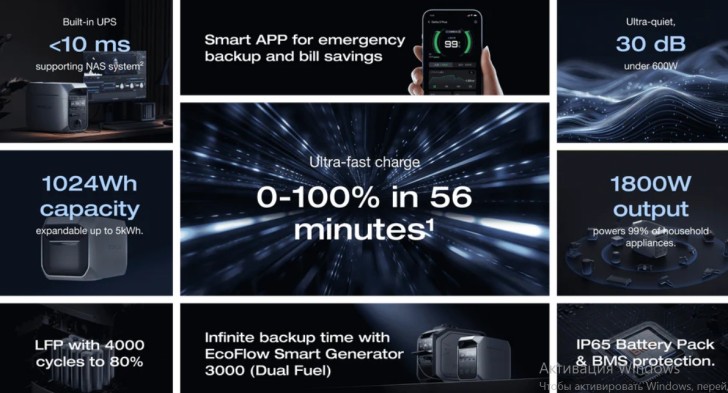While fuel generators have been the traditional option, power stations—battery-based systems that can often be recharged with solar panels—bring new economics to the table. Let’s break down whether they truly save money when compared to fuel-powered alternatives.
The True Cost of Fuel Generators
At first glance, a small gas or diesel generator seems cheap, sometimes costing just a few hundred dollars. But the ongoing costs often outweigh the initial savings.
- Fuel Expenses
- A mid-size generator typically consumes 0.5 to 1 gallon of fuel per hour.
- During a 24-hour outage, that could mean 12–24 gallons. At Canadian fuel prices (around CAD $1.60–$1.80 per liter in 2025), the costs add up quickly.
- Longer blackouts—like those after Ontario snowstorms or BC wildfires—can make fuel consumption painfully expensive.
- Maintenance Costs
- Generators require oil changes, filter replacements, and regular testing to stay reliable.
- If neglected, breakdowns can occur right when they’re most needed, adding repair costs on top.
- Storage & Logistics
- Fuel needs to be stored safely, rotated to avoid going stale, and transported when shortages occur.
- During regional disasters, fuel may be rationed or simply unavailable.
The Cost Profile of Power Stations
Power stations are battery-powered, rechargeable devices that can be charged from the wall, car, or solar panels.
- Fuel-Free Operation
- No gasoline or diesel required—just plug in or connect solar panels.
- This eliminates recurring fuel costs entirely.
- Low Maintenance
- No oil changes, spark plugs, or carburetors to manage.
- The primary care involves battery health: occasional charging and proper storage in moderate temperatures.
- Solar Integration
- Pairing with portable solar panels makes power stations sustainable for long outages.
- Once the initial investment is made, sunlight is free.
Comparing Long-Term Costs
Example: 5-Day Power Outage
- Fuel Generator
- Consumption: ~15 gallons per day (mid-size unit running fridge, lights, some electronics).
- Total fuel: 75 gallons. At CAD $6.50–$7.00 per gallon equivalent, that’s ~$500.
- Add oil changes and filter checks (~$50–$100).
- Power Station
- Initial charging from the grid: a few dollars of electricity.
- Supplement with solar panels: free energy during outage.
- Maintenance: negligible.
Result: After just a few days of use, the fuel generator may cost more to run than a power station.
Hidden Savings of Power Stations
- Indoor Use: Power stations are safe indoors, unlike fuel generators, which require outdoor placement and ventilation. This eliminates the need for long extension cords or outdoor sheds.
- Noise Pollution: Silent operation avoids complaints from neighbors and makes them usable at night without disruption.
- Longevity of Appliances: Clean, stable electricity from power stations protects sensitive electronics, while fuel generators sometimes deliver “dirty” power surges that damage devices.
- Insurance Considerations: In some cases, homeowners’ insurance may give favorable terms to properties equipped with safe, non-combustion backup systems.
When Fuel Generators Still Make Sense
Of course, power stations are not perfect for every situation:
- Heavy Loads: Running central air conditioning, large HVAC units, or industrial equipment still favors fuel generators.
- Initial Cost: A high-capacity power station often costs more upfront than a small gas generator.
- Battery Limits: Without solar or external charging, a battery-only setup may run out of juice in multi-day blackouts.
For many Canadian households, the sweet spot is using a power station for essentials (fridge, Wi-Fi, lights, medical devices) while reserving fuel generators for very heavy or prolonged loads.
The Canadian Context
- Fuel Price Volatility: With taxes and global supply issues, fuel prices in Canada are among the highest in North America. This makes fuel generators increasingly expensive to run.
- Winter Blackouts: Storing fuel in freezing conditions is a hassle, while power stations keep working as long as batteries are maintained.
- Sustainability Goals: Many provinces encourage green alternatives, making power stations an attractive long-term investment.
Conclusion
So, do power stations really save money compared to fuel generators? In most residential and light commercial scenarios, the answer is yes.
While fuel generators may still have their place for large, continuous loads, the rising cost of fuel and the hassle of maintenance tip the scale in favor of battery-based systems. Over the life of the unit, a power station can offer not only financial savings but also peace of mind, safety, and environmental benefits.
For Canadian families facing harsher winters, higher fuel costs, and more frequent outages, the shift to portable energy isn’t just about resilience—it’s about long-term economic sense.
 Editorial staff
Editorial staff

 Editorial staff
Editorial staff


